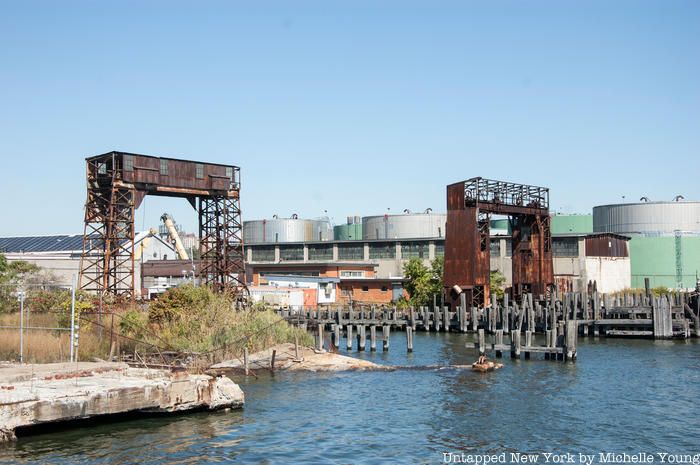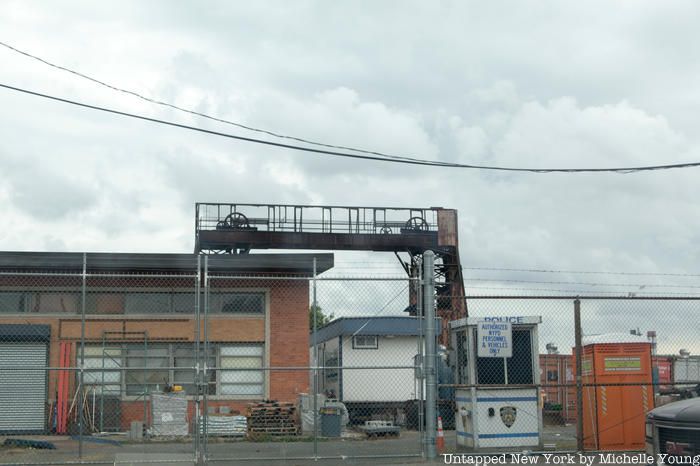NYC’s Forgotten ‘War on Christmas Trees’
Discover how an obscure holiday crackdown affects festive street vendors today!


New York City’s remaining gantries loom like industrial relics, reminding us of a once bustling waterfront where railroads and ships powered the nation’s industry. Some gantries have been preserved, like the pair at Hunters Point in Long Island City or those at Governors Island which serve as branded visual icons, or the one along the Hudson River at 69th Street that rises curiously from the water. Others are more remote and off-limits, including ones at North Brother Island and on Hart Island.
A pair of gantries in the Bronx fall into this latter category. Because they sit on land inaccessible to the public, the Port Morris gantries are far less well-known, but no less notable. Now, a new effort has been started to landmark these maritime structures. Recently, a request to landmark the gantries was sent to the New York City Landmarks Preservation Commission and the group behind the effort is collecting a petition in support. One of the main concerns for the group is the state of deterioration of the gantries, and they write in the request, “continued exposure to the elements has negatively impacted the historic structures and demolition is not out of the question given rampant development pressures along the coasts of every borough of New York City.”

The Port Morris gantries, located at 134th Street along the waterfront, date to 1925 and are unique amongst the New York City gantries because they were constructed for ferries and institutional uses, rather than for freight. The ferry system the Port Morris gantries were part of were essential for those that worked and lived on institutional islands like Rikers Island and North Brother Island. In particular, the larger ferry bridge at Port Morris could host boats that could carry cars, before the bridge was built to Rikers Island, for example.

The majority of the Port Morris waterfront, former railroad property, belongs to the New York State Department of Transportation, which leased out the 96-acre parcel in 1991 to a private developer, Harlem River Yards Ventures, Inc. This entity has subleased the land to companies like Fresh Direct, New York Post, FedEx and other companies, which have constructued large-scale industrial facilities that have effectively cut off access to the waterfront. As such, the Mott Haven neighborhood has become encircled by elevated highways that date to the Robert Moses era and an inaccessible industrial waterfront zone.

The Port Morris gantries sit at the end of a parcel of land shared by NYPD and New York City Transit Authority. The land is technically owned by the New York City Department of Citywide Administrative Services and serves mostly as car parking and vehicle storage. Harry Bubbins, a longtime environmental justice and historic preservation advocate and a co-founder of South Bronx Unite coalition, tells Untapped New York:
“The South Bronx has no official public waterfront access along miles of coastland. The gantries are an example of the rich nautical history of New York and could become a bridge to future community use. While similar such structures have protected status and are the centerpiece of neighborhood plazas, greenways or boat slips, Port Morris has not received the same consideration. They should be landmarked and serve as an anchor for a vibrant new green space and public access point to be enjoyed by longstanding residents and new arrivals alike.”
There are only nine individual landmarks within Community District 1 in the South Bronx, and the last landmark was designated back in 2012. While the Port Morris gantries are listed on the National Register of Historic Places, having been added in 2013, it is not a New York City landmark unlike the gantries in Long Island City, Governors Island, and West 69th Street in Manhattan. The gantries could become an architectural focal point for the proposed South Bronx Greenway, over a decade in the making and not close to completion.
You can add your name to the petition to save the Port Morris gantries here. Next, check out more of NYC’s remaining gantries.
Subscribe to our newsletter